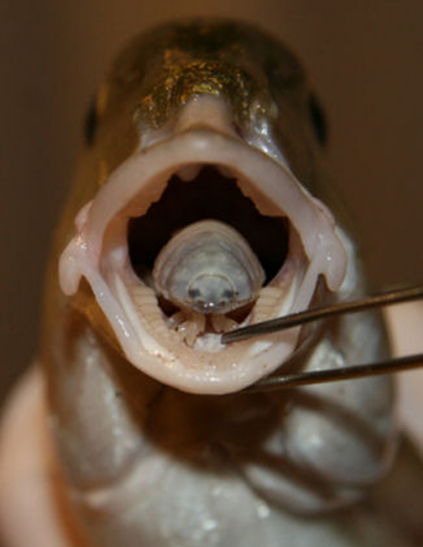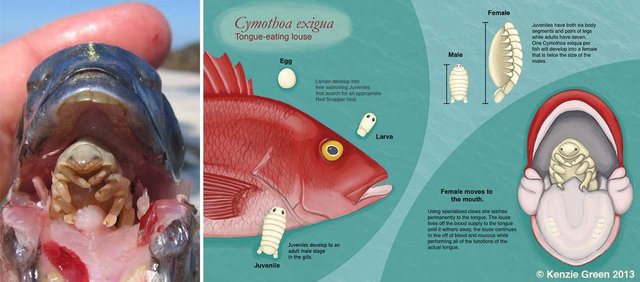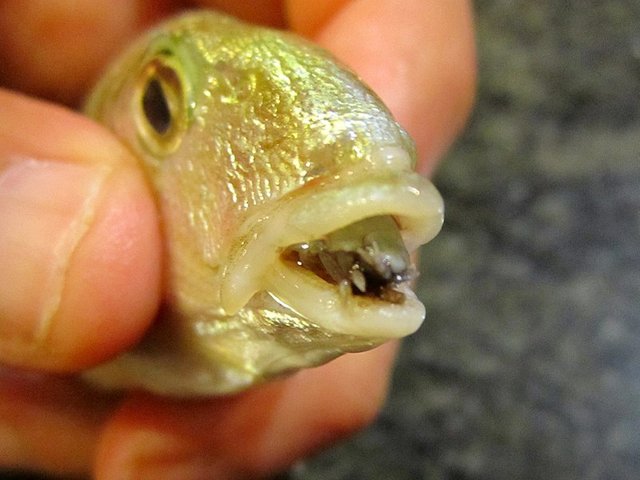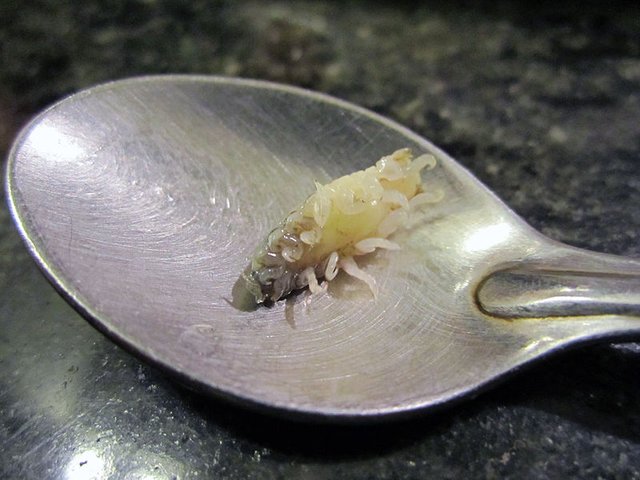Cymothoa exigua: The Parasite That Turns Into A Tongue ?!?!
Welcome to another post of my strange animals series where you get to meet some of the weirdest, coolest, and craziest animals on a daily basis!
Today, I want to introduce you to what I think is the weirdest, most frightening and unique parasite on planet Earth, the Tongue-Eating Louse. Among other things, what makes this parasite truly unique is that it's the only known parasite that entirely replaces a host's organ with...itself!
Let's start with a photo, hope it doesn't give you nightmares:
Tongue Eating Louse (Credit: Maria Sala)
Scientifically described as Cymothoa exigua, this nasty isopod is named this way, as you have probably already guessed, because it consumes the tongue of its host!
Now, let's learn more about it!
Hosts & Distribution
Before we delve into the details of C. exigua's lifecycle, I think it's best to start with the basics, its hosts. Don't worry, humans are not one of them!
This isopod is known to parasitize eight species in two orders and four families of fishes [7 species of order Perciformes: 3 snappers (Lutjanidae), 1 species of grunt (Haemulidae), 3 drums (Sciaenidae), and 1 species of order Atheriniformes: 1 grunion (Atherinidae)]. New hosts from Costa Rica include the Colorado snapper, Lutjanus colorado and Jordan's snapper, L. jordani [1,]
Please note that this list is probably not complete as every now and then researchers discover new fish species that fall victim to C. exigua!
The species has a very wide distribution, which is believed to be expanding. It is known to occur from the Gulf of California south to north of the Gulf of Guayaquil, Ecuador, as well as in parts of the Atlantic, in depths ranging from 2 to at least 60 meters. Sightings have also been reported in the UK and Greece.
Life Cycle
Although we still don't know the full details of this creature's life-cycle, we do have a good understanding of the basics.
The life of a tongue louse begins as a tiny larva that hatches from an egg. This larva grows, develops into a juvenile and eventually parasitizes the host fish, entering from the gills. This is now where things begin to get interesting. The tongue eating louse exhibits protandric hermaphroditism. This mean that all individuals begin their life as males.
After entering the host, the creature either remains male and stays put on the branchial arch (gills) or turns into a female and migrates to the mouth. Once there, she will latch onto the tongue and start sucking & feeding with blood directly from the main artery!
As time passes, the parasite gets bigger and bigger and the tongue atrophies until.. there is no tongue anymore! Then the parasite attaches itself to the stub and becomes the new...tongue ! Interestingly the fish continues to use the new "tongue" when possible, for example to grind food against the tiny teeth on the roof of its mouth.
At some point, the male climbs to the mouth, mates with the female and eggs are released into the sea. The circle is complete!
When the host dies, the isopod has been reported to detach itself from the fish and cling to the head or body externally. What happens in the wild after that is still a mystery!
 The LifeCycle of The Tongue Eating Louse (Credit)
The LifeCycle of The Tongue Eating Louse (Credit)
Is It Dangerous to Humans?
No, don't be afraid. You won't wake up one day with an isopod in the place of your tongue. Still, be careful if you see one of them cause they have a nasty bite!
The End
So this is pretty much all the basics you need to know about this amazing parasite. Below you will find some related videos and some other quick and interesting facts about the creature. As always, don't forget to check the references if you want to know every little detail about this critter!
See ya tomorrow in my next strange animal post :)
Related Videos
Some Other Quick & Interesting Facts
- Males (which stay on the gills) appear to feed on fish mucus
- Although the parasite doesn't seem to do any visible damage to the host, other than replacing the tongue, it has been reported that infested fish are usually underweight
- Adult females are 8 to 29 mm(0.3 to 1.1 in) long and 4 to 14 mm (0.16 to 0.55 in) in width. Males are 7.5 to 15 mm (0.3 to 0.6 in) long and 3–7 mm (0.12–0.28 in) in width.
- There are two other species of Cymothoa, known to parasitise fish in a similar fashion; Cymothoa borbonica and Ceratothoa imbricata.
References
- Wikipedia.org/wiki/Cymothoa_exigua
- Drwinfoundation.org/datazone/media/pdf/62/NG_62_2003_Williams%26Bunkley-Williams_Fish-parasitic_isopods.pdf
- Jstor.org/stable/1444352?seq=1#page_scan_tab_contents
- Amazinglife.bio/tongue-eating-louse-cymothoa-exigua/
- Eol.org/pages/126897/details
My dear readers, thank you for reading today's article. Hopefully, you found it interesting enough to follow me, @trumpman. You may also want to check my strange animal series where you get to discover some of the world's weirdest animals! Here are the last 3 weirdos of the series:
- 8 Strange Animal Stuff I Learned The Past Few Days
- New Cave Dwelling Animal Discovered With The Help Of Smelly Cheese
- This Alien-like Worm Will Freak You Out!
Steemstem & SteemitEducation
Steemstem is the go-to place for science on Steemit. Check it out at @steemstem or visit the #steemSTEM channel. A big thank you also goes to the guys from @steemiteducation for sharing my content all the time!
Greek Community
A final big thanks goes to all my fellow greeks who support me with their love! You guys rock!



Cool to have a buddy for the lonely days :D
I prefer to stay with out buddies :P
If I would've found this before I did my post over the tongue-eating louse, I would not have done my post over the tongue-eating louse.
Shit.
Don't worry man :* it's not like I am the first I wrote about this creature on the internet and you won't be the last ;)
Thank you, thank you :D
Εγώ αυτό το ξέρω σαν ψείρα, πολλές φορές το βρίσκω κολλημένο πάνω στο σώμα του ψαριού. Δεν ήξερα ότι τρώει τη γλώσσα, προφανώς θα είναι άλλο είδος. Επίσης απ'ότι ξέρω η ψείρα χρησιμοποιείται για φάρμακο.
χμμμμ, εσυ μάλλον λες κάτι άλλο. Στην ελλαδα από οτι είδα υπάρχει μόνο ένα κατεγεγραμένο περιστατικό. Και γενικά αυτό το μαμούνι μένει μέσα στο ψάρι, η στα βράγχια (τα αρσενικά) ή στο στόμα (τα θηλυκά).
Οπτικά μοιάζει πολύ αλλά αυτό το είδος που υπάρχει στην Ελλάδα λογικά κολλάει μόνο στο σώμα.
αν ξαναβρεις βγαλε μια φωτογραφία, είμαι περίεργος ^_^
Κάπου είχα αλλά δεν μπορώ να την βρω, στην επόμενη ψειροψαριά!
For me, perhaps, the most disgusting aspect is that these parasites mate inside the mouth... :(
Hahahahahah, that's a very good point XD
Anyone watching The Strain?? This shit's about to get weaponized...
I watch it and I really enjoyed it. The last season was a bit mieh, but overall a good series ^__^
This post has received a 11.11 % upvote from @buildawhale thanks to: @trumpman. Send at least 0.100 SBD to @buildawhale with a post link in the memo field to bid for a portiona of the next 100% upvote.
To support our curation initiative, please vote on my owner, @themarkymark, as a Steem Witness
Shoot!!! Is there a way to unsee this?
Lol
No :( But you can mute me cause I plan to post more creepers like this one :P
Omg...!!! 😨
Nice post.😊😊
Thanks! Isn't it beautiful?
Προειδοποιεί ο κόσμος! Μην το δείτε (post)νυχτιάτικο.... Πολύ καλό , Μπράβο!resteem
ευχαριστώ :D
Thanks for the perfect post! @trumpman